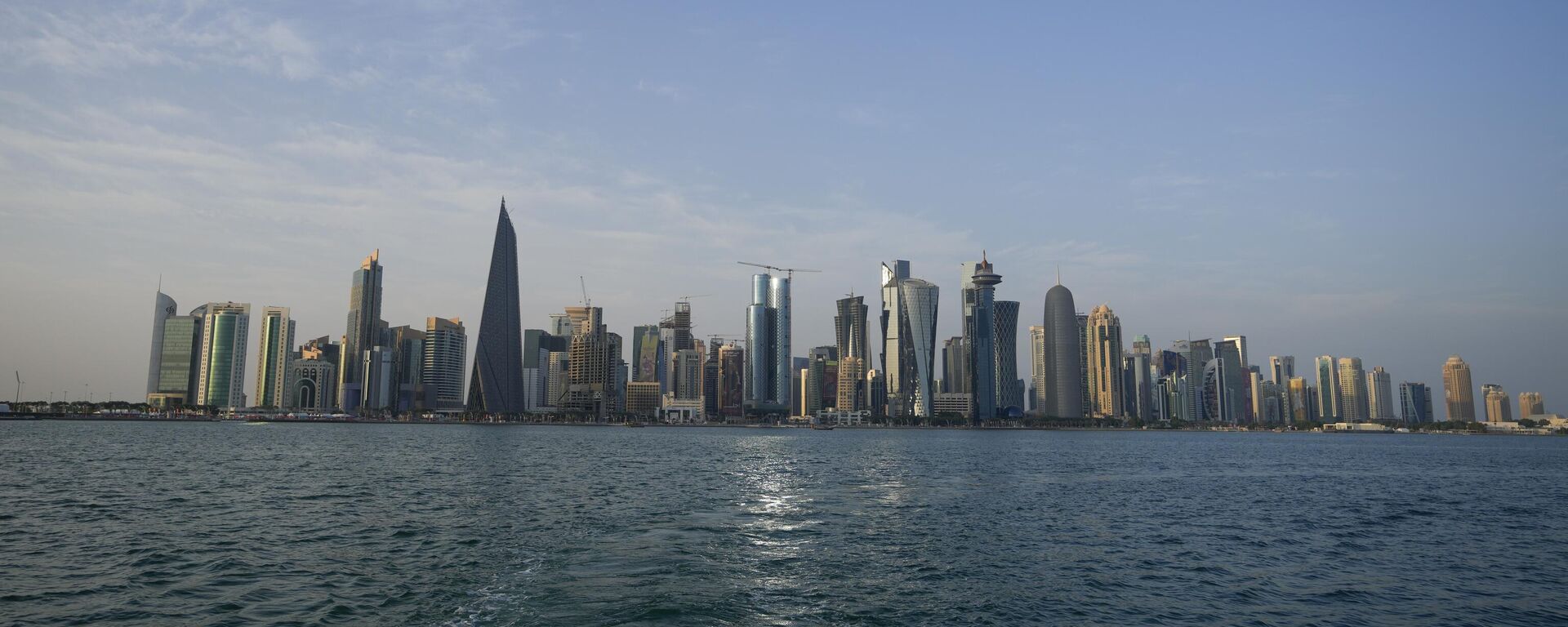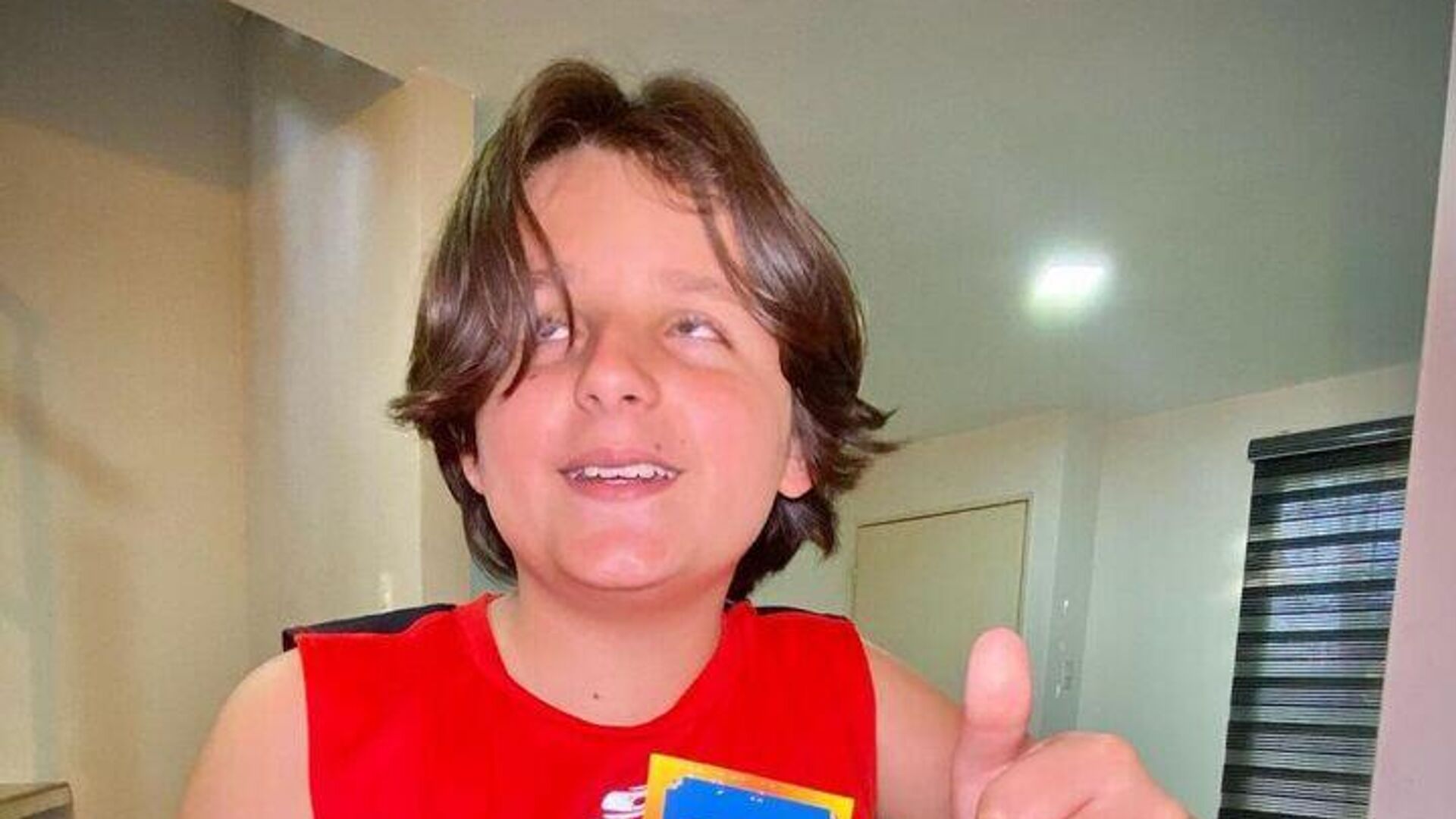https://sputnikglobe.com/20221125/blind-venezuelan-boy-translates-2022-world-cup-album-into-braille-1104502441.html
Blind Venezuelan Boy Translates 2022 World Cup Album Into Braille
Blind Venezuelan Boy Translates 2022 World Cup Album Into Braille
Sputnik International
The 12-year-old became an international internet sensation after he converted the 2022 FIFA World Cup Qatar sticker collection album into Braille to make the... 25.11.2022, Sputnik International
2022-11-25T12:16+0000
2022-11-25T12:16+0000
2022-11-25T12:18+0000
2022 fifa world cup
venezuela
boy
blind
https://cdn1.img.sputnikglobe.com/img/07e6/0b/19/1104693420_0:47:720:452_1920x0_80_0_0_2429f23238b5a008a404a674d0175524.jpg
"The video that led me to what I have now [this fame] is the one where I teach coloring books. Then there was a video of me translating a restaurant menu into Braille, and then this: a World Cup album video," Sebastian Filoramo told Sputnik. The Venezuelan used social media to prove that disability is not a handicap and that with the right tools and support from his family, he can achieve anything: read, color, do math, play various instruments, and even ride a bike.Sebastian wanted to experience all the passion and emotion of the World Cup in Qatar like many other children and adults, so thanks to his father's ingenuity and the help of his teacher, he converted the Panini album into Braille. The whole process of making a new version of this famous album at home was captured on video, which in a few days went viral and attracted the attention of the global press. "I really like that my album is going around the world. Hopefully Panini will respond and release an album in Braille by 2026," he said. Writing in Braille Is Easy, Reading Is Difficult In Latin America alone, 85 million people live with some form of disability, representing 14.7% of the population, according to the World Bank. However, the lack of public policies, discrimination, and prejudices that still exist in the region prevent this sector of the population from achieving autonomy and independence. Sebastian's dream is to live in a world where people with disabilities can go into a restaurant where staff speak fluent sign language and offer menus in Braille to be able to order what they want without assistance. In August, the local coffee shop “La Estación” contacted the boy to ask him to translate their menu into Braille. This project, also filmed for his social media, taught Sebastian that his work can improve the quality of life of others, and by turning in the translation, he realized that he wanted to continue fighting for global inclusion."It was so exciting. I felt really good because I thought that now blind people could go to this café and ask for their menu, just like everyone else does," Filoramo said. A particular highlight among his social media posts are tutorials with school assignments in which he describes how he adapts his assignments to the Braille system for his checkered notebooks, a punch-hole, a typewriter and the silicone his father uses to delineate the edges of drawings and create codes for identifying colored pencils. Sebastian has been learning Braille since he was five years old, and thanks to the support of organizations like the Comprehensive Care Center for the Visually Impaired [CAIDV], children like him are able to integrate into the education system, although there is still a lot of work to do to make school classes an inclusive place. "I looked for a place in many schools in Barquisimeto [Venezuela], and they didn't want to take me, except my school Colegio Andres Bello, which gladly gave me a place. As they themselves said, 'It's a real challenge,' because even if they weren't ready to accept me, they accepted me, and that's how it should be in all schools," he told Sputnik. According to UNESCO, 15% of children with disabilities in Latin America do not go to school, although some 22 countries in the region have laws prohibiting discrimination in the educational environment. Teachers and staff of educational institutions are also not professionally trained to create the necessary socio-emotional conditions within the framework of inclusive pedagogy. That is why the regional average rate of non-participation in primary education among children with disabilities is four times higher than among children without disabilities. Given these numbers, the work of influencers like Filoramo becomes important. With a community of more than 280,000 subscribers that continues to grow every day, his work serves as an inspiration for empowering teachers and, especially, families who care for people with disabilities. In a sense, this Venezuelan boy is now following in the footsteps of what 15-year-old Louis Braille achieved in the 19th century, when he took the achievements of his time for the blind and transformed the method of "night writing" (with convex dots and dashes) into what we now know as the Braille system. Sebastian is learning more and more about technology every day, using tools like VoiceOver to take advantage of his smartphone. Now he plans to become a software developer, creating screen readers to help blind people use their computers. He does all this as part of his main goal of promoting awareness of how important inclusion is. "I envision myself as a great programmer giving music concerts and conferences around the world," he admitted.
https://sputnikglobe.com/20221120/top-10-reasons-why-qatar-is-a-good-choice-for-fifa-world-cup-2022-to-take-place-1104316058.html
venezuela
Sputnik International
feedback@sputniknews.com
+74956456601
MIA „Rossiya Segodnya“
2022
Sputnik International
feedback@sputniknews.com
+74956456601
MIA „Rossiya Segodnya“
News
en_EN
Sputnik International
feedback@sputniknews.com
+74956456601
MIA „Rossiya Segodnya“
Sputnik International
feedback@sputniknews.com
+74956456601
MIA „Rossiya Segodnya“
world cup in qatar, qatar world cup, translated into braille, blind venezuelan boy
world cup in qatar, qatar world cup, translated into braille, blind venezuelan boy
Blind Venezuelan Boy Translates 2022 World Cup Album Into Braille
12:16 GMT 25.11.2022 (Updated: 12:18 GMT 25.11.2022) The 12-year-old became an international internet sensation after he converted the 2022 FIFA World Cup Qatar sticker collection album into Braille to make the competition “truly inclusive.”
"The video that led me to what I have now [this fame] is the one where I teach coloring books. Then there was a video of me translating a restaurant menu into Braille, and then this: a
World Cup album video," Sebastian Filoramo told Sputnik.
The Venezuelan used social media to prove that disability is not a handicap and that with the right tools and support from his family, he can achieve anything: read, color, do math, play various instruments, and even ride a bike.
"It shows me that there are no limits for me, and that's why I always say: only the sky is the limit, all the limits are in our heads and we set them for ourselves," he added.
Sebastian wanted to experience all the passion and emotion of the
World Cup in Qatar like many other children and adults, so thanks to his father's ingenuity and the help of his teacher, he converted the Panini album into Braille. The whole process of making a new version of this famous album at home was captured on video, which in a few days went viral and attracted the attention of the global press.
"I really like that my album is going around the world. Hopefully Panini will respond and release an album in Braille by 2026," he said.
Writing in Braille Is Easy, Reading Is Difficult
In Latin America alone, 85 million people live with some form of disability, representing 14.7% of the population, according to the World Bank. However, the lack of public policies, discrimination, and prejudices that still exist in the region prevent this sector of the population from achieving autonomy and independence.
Sebastian's dream is to live in a world where people with disabilities can go into a restaurant where staff speak fluent sign language and offer menus in Braille to be able to order what they want without assistance. In August, the local coffee shop “La Estación” contacted the boy to ask him to translate their menu into Braille. This project, also filmed for his social media, taught Sebastian that his work can improve the quality of life of others, and by turning in the translation, he realized that he wanted to continue fighting for global inclusion.
"It was so exciting. I felt really good because I thought that now blind people could go to this café and ask for their menu, just like everyone else does," Filoramo said.
A particular highlight among his social media posts are tutorials with school assignments in which he describes how he adapts his assignments to the Braille system for his checkered notebooks, a punch-hole, a typewriter and the silicone his father uses to delineate the edges of drawings and create codes for identifying colored pencils.
"First you have to learn the Braille alphabet from A to J, and when you learn it, you continue from J to Z. Writing is easy, but reading is very difficult, in fact I'm still a slow reader for my age," the young Venezuelan explained.

20 November 2022, 09:23 GMT
Sebastian has been learning Braille since he was five years old, and thanks to the support of organizations like the Comprehensive Care Center for the Visually Impaired [CAIDV], children like him are able to integrate into the education system, although there is still a lot of work to do to make school classes an inclusive place.
"I looked for a place in many schools in Barquisimeto [Venezuela], and they didn't want to take me, except my school Colegio Andres Bello, which gladly gave me a place. As they themselves said, 'It's a real challenge,' because even if they weren't ready to accept me, they accepted me, and that's how it should be in all schools," he told Sputnik.
According to UNESCO, 15% of children with disabilities in Latin America do not go to school, although some 22 countries in the region have laws prohibiting discrimination in the educational environment. Teachers and staff of educational institutions are also not professionally trained to create the necessary socio-emotional conditions within the framework of inclusive pedagogy. That is why the regional average rate of non-participation in primary education among children with disabilities is four times higher than among children without disabilities. Given these numbers, the work of influencers like Filoramo becomes important. With a community of more than 280,000 subscribers that continues to grow every day, his work serves as an inspiration for empowering teachers and, especially, families who care for people with disabilities.
Sebastian Filoramo urges parents of children with disabilities: “If you have a blind son, or a blind daughter, or someone with a disability, don't limit them. The way I did, when I said: ‘I want to translate my album.’ Help them adapt, help them invent new things to learn what interests them, involve them in everything.”
In a sense, this Venezuelan boy is now following in the footsteps of what 15-year-old Louis Braille achieved in the 19th century, when he took the achievements of his time for the blind and transformed the method of "night writing" (with convex dots and dashes) into what we now know as the Braille system. Sebastian is learning more and more about technology every day, using tools like VoiceOver to take advantage of his smartphone. Now he plans to become a software developer, creating screen readers to help blind people use their computers. He does all this as part of his main goal of promoting awareness of how important inclusion is. "I envision myself as a great programmer giving music concerts and conferences around the world," he admitted.



